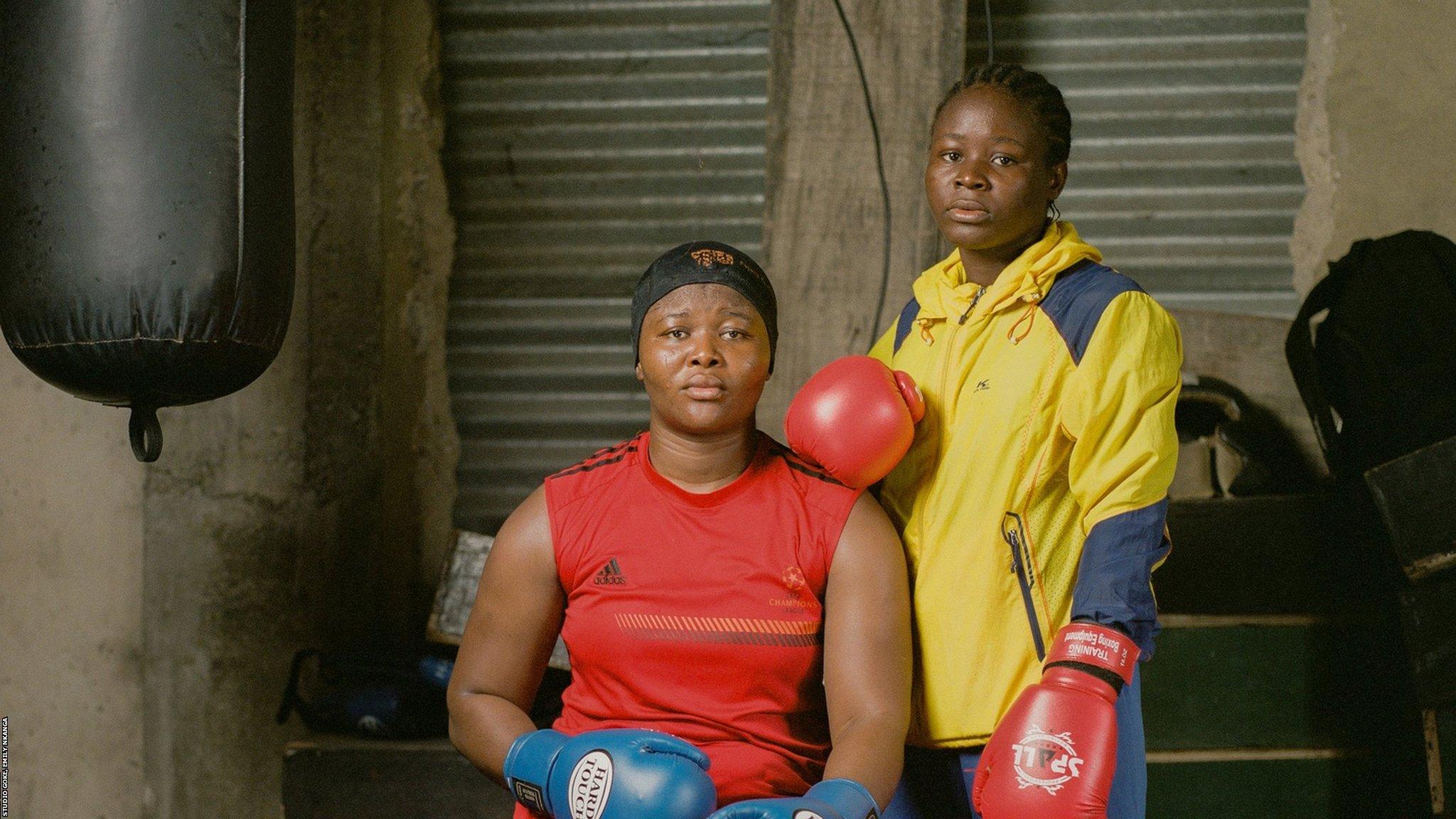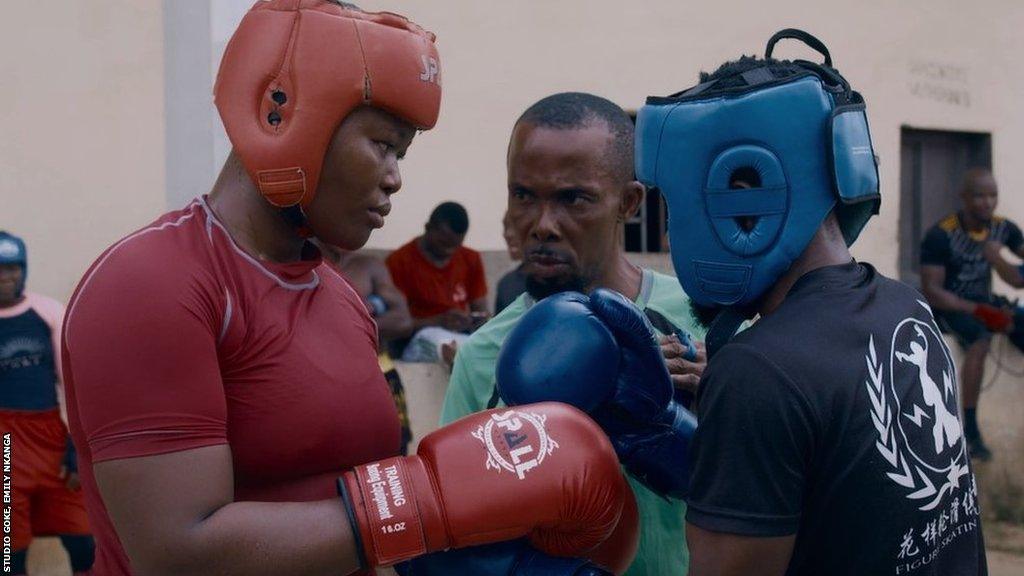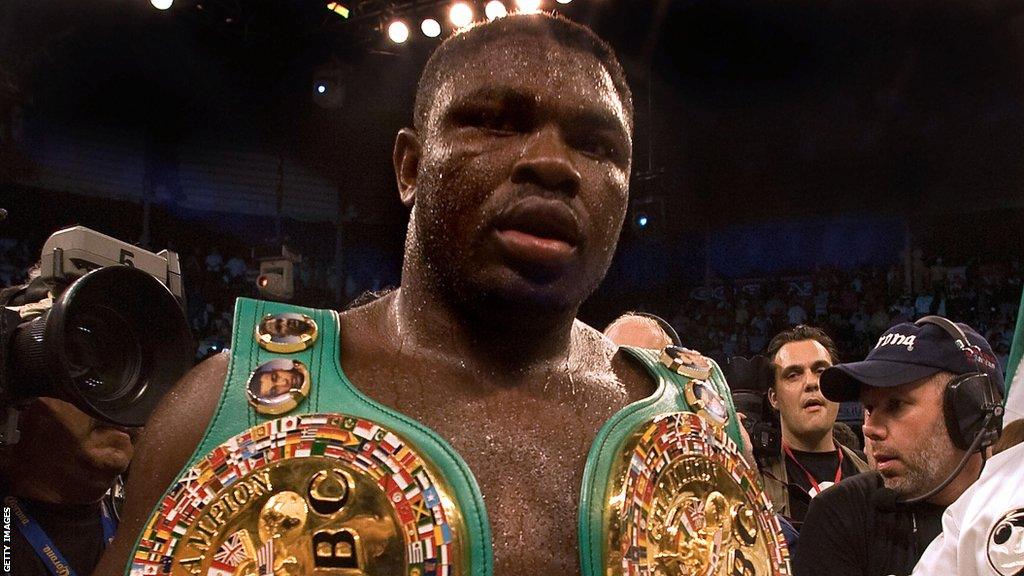Boxing: The Nigerian Olympian who trains champions in a gym with no room for a ring
- Published

Idara Udoette (right) and Dorcas Onoja have dreams of following in the footsteps of former boxing world champion Samuel Peter (CREDIT: Emily Nkanga, "Reaching For Gold")
When Emily Nkanga saw a photograph on social media of a boxing ring being used after dark in the city of Uyo more than two years ago, the British-Nigerian film-maker might not have imagined where her curiosity would lead her to.
Nkanga had decided to learn more about Nigeria, particularly her tribe, following the death of her father, having lived in the country for more than 20 years before moving to Britain.
That initial unusual sighting, she would later learn, contained the glimmers of a story about Nigerian society.
"Somebody had posted a picture of the ring," Nkanga told BBC Sport Africa. "I was a bit confused about why it was smack in the middle of the street.
"It was during the night, too. The person had captioned it: 'Look what I found in Uyo.'"
The amateur boxing showcase partly raised awareness of the funding needed by the Akwa Ibom State Boxing Association, based in the region encompassing Uyo.
But it was also a reflection of the realities for the gym, which often has to hold training outside because of its lack of capacity.
There is no shortage of expertise involved, though. The man leading the sessions is Effiong Okon, who boxed at the 2004 Olympic Games in Athens and was a stablemate of former heavyweight world champion Samuel Peter, external.
Champions in the making
"Our ring is always set outside because our gym is not spacious enough," says Effiong, who started out by volunteering to teach boxing at schools and now works alongside fellow coach George Edet to bring youngsters off the streets and in to train.
"The gym is small and cannot accommodate both the ring and the boxers. Occasionally, the ring is mounted outside when there are competitions, trials and sparring sessions.
"A boxing ring is not something to be exposed to both the sun and the rain."

George Edet (centre) is portrayed in the documentary, Reaching for Gold, holding outdoor sessions in Akwa Ibom (CREDIT: Emily Nkanga, "Reaching For Gold")
Even without the ring, the crowded nature of the association's training can be "crazy", says Nkanga, who had originally envisioned portraying the gym as part of a photography project.
The story proved so compelling that Nkanga decided to make it the subject of a short film inspired by two young women, Idara Udoette and Dorcas Onoja, among the male-dominated training she saw.
Despite football and basketball tending to be more popular sports, Udoette's passion for boxing inspired her to pursue pugilism as a 14-year-old.
Udoette had heard about Peter - one of several boxers from the state to compete internationally, but its first heavyweight to fight overseas - when she was at primary school.
"I was like, 'OK, someone else can also be like him from Akwa Ibom State," she tells the documentary of the man who won the WBC belt in Mexico in 2008 - an achievement that ranks as one of the most memorable in Nigerian sporting history.
Onoja moved more than 450km from the state of Kogi to Akwa Ibom because of her father's role as a clergyman.
"I really want to be the world champion," she says in the film.
"My late uncle was a boxer. I love seeing people boxing."
Peter's influence holds a pervading power Okon appreciates. "Some of them will get frustrated and go back to the streets," he says of the prospects passing through his doors. "But if people see a man from the streets become a hero, all of them will want to be like him."

Peter won 38 of his 47 fights between 2001 and 2019, taking on the likes of boxing greats the Klitschko brothers
Flyweight Udoette's first youth championship win arrived in 2017. She has since won gold at the Nigerian National Sports Festival, which Effiong proudly sends athletes to in the hope of improving on the state's medal haul each time.
The inter-state competition acts as a qualifier for national team selection, and with it the chance to compete at the Olympics.
Onoja won gold at light-heavyweight in 2018 despite having only trained for six months, competing for three states on her way to becoming champion.
Udoette missed out on a potential place at Paris 2024 but won a bronze medal at the 2022 festival. She has since moved to Delta State to train five days a week with the national team, but maintains a good relationship with Effiong.
"Not being able to have the proper facilities gave us a tough time because, when other people are using punching bags, we didn't have all of that equipment," she says, discussing Akwa Ibom.
"Everyone is focused on football and forgets about individual sports. So individual sports are dying."
Olympic dreams are 'a serious business'
As a result of the gym's limitations, Effiong deploys more cardiovascular activities instead of bag work, such as running and skipping.
"The challenge is to bring out another Olympian," he says of his enduring ambition.
"We don't have the equipment. We don't have gloves. I can't afford to buy equipment like we used to and we have no sponsor.
"The state wants us to produce champions, but what makes a champion? They didn't think about that.
"I need a sponsor. I need somebody that will back me, because I don't want this talent to die out."
The predicament of the gym is reflective of the challenges facing many people in Nigeria. "Not a lot of people want to invest," says Nkanga. "Boxing and being Nigerian is already a challenge.
"How do they keep going, day to day? They need to eat, pay bills and feed their families.
"In some cases, you might have your family telling you to get married or do some other work. You have famous boxers but it's not the most popular sport, so a lot of people would rather invest in football first.
"A lot of the challenges they face are about being Nigerian in that economy. They are really underfunded.
"There were a lot of men there, but I felt that it was important and a stronger story to tell of these two women who are sparring with the men, training with them, trying to get to the next level of their careers.
"For them, it's also a place to go and forget about all the economic hardships that are happening, just for however long they train.
"They see it as a family. It's very important to have that kind of community aspect. The club is seen as a safe space rather than being out there in the world."
Nkanga is raising funds for the gym with the film, called Reaching for Gold. "I saw them trying to reach for the highest point," she says.
"Trying to get to the Olympics is a serious business.
"Meeting with them and interacting with them on that first day inspired me. It gave me hope that you can do great things from little places.
"You don't need everything in place - you need your mind and determination.
"It is documenting a process in time for them. They're on their way. They're not there yet, but they can get there if people support them."